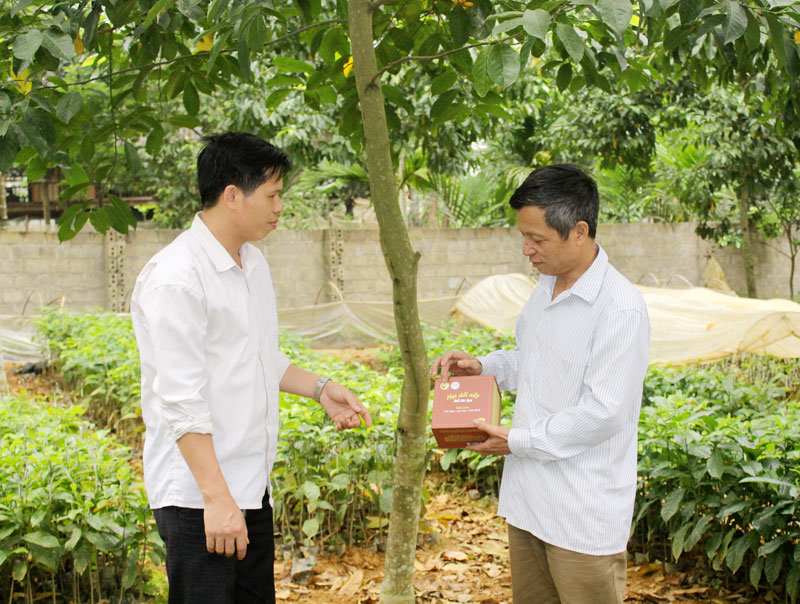
(HBO) – Chi Dao "doi” seed, a staple of Chi Dao commune (Lac Son district), has been given a three-star rating in Hoa Binh province’s One Commune One Product (OCOP) programme. The recognition offers opportunities for the product to reach further, raking in sustainable economic growth for local residents in Muong Be.
 Chi
Dao "doi” seed (Lac Son district) has received a three-star recognition of the
province’s OCOP programme. Its package contains label, barcode and traceability
code.
Chi
Dao "doi” seed (Lac Son district) has received a three-star recognition of the
province’s OCOP programme. Its package contains label, barcode and traceability
code.
Muong Be is a long-time name of the land
famous for "doi” seed – Chi Dao commune. Over the past 10 years, decade- and
centenary-old "doi” trees situated next to wooden stilt houses have brought
prosperity to people in the remote area.
Since the plant has gained public
attention, local authorities and residents have been doing their best to
promote the product and its brand, as well as help it reach markets nationwide.
The establishment of a cooperative on "doi” seedling supply and agricultural
services in Chi Dao commune was part of the efforts.
Progress has been made since the birth of
the cooperative. It is able to retain quality of the local seed among those
produced in other places. At the same time, members are advised not to opt for
profit at the expense of quality by choosing a prompt but inaccurate processing
method, such as boiling the seed for quicker drying process.
Notably, seedlings of Chi Dao commune have
been known to customers across the country. Chi Dao "doi” trees are being
cultivated in forests of many Central Highland provinces.
The recent recognition is expected to
facilitate the development and value of Chi Dao "doi” tree. To seize the
opportunities, locals need to take the initiative in production and improve
quality product in the competition against other brands in a bid to protect
their own staple.
"Doi” growers in the commune also hope to
receive due attention and support from relevant agencies in terms of training,
application of science-technology, and trade promotions./.
The Standing Board of the Hoa Binh provincial Party Committee has agreed in principle on a proposal by the Standing Board of the Party Committee of Hoa Binh city to gather feedback on the city’s 1:2000 zoning plan, which forms part of its broader urban development strategy.
Hoa Binh province has made notable progress in public administration reform and digital government development, with the satisfaction index among citizens and businesses reaching over 84%, according to recent government evaluations.
Thanks to great efforts by local authorities in recent times, the governance and public administration performance of Mai Chau district has been significantly improved.
In the afternoon of June 6, the Party Committee, the People's Council, the People's Committee and the Fatherland Front of Lac Son district solemnly held a meeting to celebrate the 139th anniversary of the district's founding (1886–2025) and the 79th anniversary of the establishment of the district's Party Committee (1946–2025). There was the attendance of Mr. Bui Van Thang, the Vice Chairman of the Provincial People's Council; Mr. Quach Tat Liem, the Vice Chairman of the Provincial People's Committee; Ms. Dang Bich Ngoc, the Deputy Head of the National Assembly Delegation of the province; as well as the former leaders of the province and district through various periods, who are the natives of the district.
Implementing the Politburo’s Resolution No. 57-NQ/TW on breakthroughs in science – technology, innovation, and digital transformation is a golden opportunity for the northern mountainous province of Hoa Binh to renew growth model, improve competitive edge and shorten digital gap.
Resolution 57-NQ/TW, issued by the Politburo on December 22, 2024, identifies sci-tech, innovation, and digital transformation as strategic breakthroughs to build a developed and prosperous nation. In Hoa Binh province, this spirit is not just a slogan, it’s being put into action through concrete initiatives that form a "new development triangle”: digital citizenship, digital economy, and digital administration.



 Chi
Dao "doi” seed (Lac Son district) has received a three-star recognition of the
province’s OCOP programme. Its package contains label, barcode and traceability
code.
Chi
Dao "doi” seed (Lac Son district) has received a three-star recognition of the
province’s OCOP programme. Its package contains label, barcode and traceability
code.